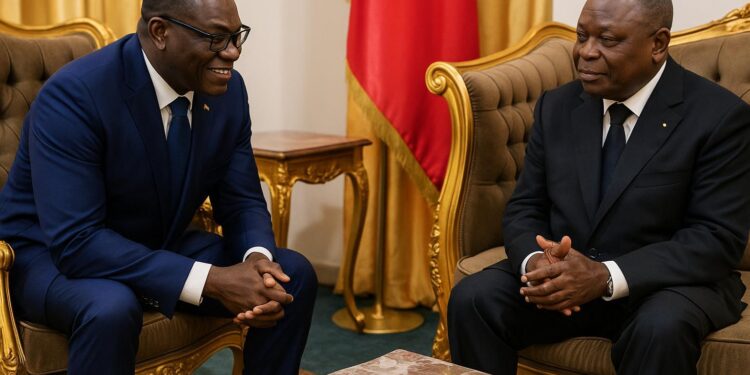Strategic dialogue shapes health agenda
In Brazzaville, World Health Organization Representative Dr Vincent Dossou Sodjinou held extended talks with Senate President Pierre Ngolo, underscoring the Upper House’s influence on public-health strategy and fiscal allocations. Both sides framed the encounter as a forward-looking review rather than a crisis meeting.
Dr Sodjinou stressed that parliamentary engagement is central to translating government health priorities into enforceable legislation and adequate line items. Senators, he noted, can align oversight with technical guidance, ensuring that ambitious goals are matched by predictable funding streams.
“Our role is to support the government technically, but the Senate controls the purse strings,” he told reporters afterward. Observers present described a cordial atmosphere and a shared intent to synchronise legislative timetables with the Ministry of Health’s planning cycle.
Cholera and mpox drive immediate action
Recent clusters of cholera prompted the WHO office to request accelerated surveillance resources. Senators were briefed on case-management gaps, notably in peri-urban districts where safe water access remains uneven. Early detection, Dr Sodjinou argued, cuts treatment costs and saves lives.
Mpox, formerly known as monkeypox, also figured prominently. Although current incidence is limited, officials agreed that mobile response teams and improved laboratory diagnostics are prudent precautions. The chamber voiced support for contingency credits should a wider vaccination campaign become necessary.
By focusing on these twin threats, the discussion highlighted how acute outbreaks test Congo’s readiness and how legislative agility can shorten the response curve from weeks to days.
Guarding against cross-border Ebola risk
The meeting also examined the spectre of Ebola emanating from neighbouring Democratic Republic of Congo. Trade corridors and family links keep traffic brisk, making screening and community awareness vital. Senators were reminded that a single imported case could strain hospital capacity.
WHO guidelines call for continuous drills at priority border posts, coupled with rapid-diagnostic kits and personal protective equipment. Dr Sodjinou said technical teams are available, but budget top-ups are required to keep stocks fresh and staff trained.
Senate leaders nodded to the importance of pre-emptive allocation before the annual budget is finalised. Proposals include a ring-fenced emergency fund that ministries could access without lengthy administrative clearance.
Hospitals built, primary care next
Congo-Brazzaville has invested heavily in secondary and tertiary facilities over the past decade, a point the WHO envoy praised as “extraordinary progress.” Modern regional hospitals now dot the map and provide specialised services once available only abroad.
Yet the conversation shifted to the bottom of the health pyramid. Integrated health-care centres, often the first point of contact for rural populations, require skilled staff, reliable equipment and stable drug supplies. Gaps here, the officials agreed, undermine gains made at higher levels.
Expanding local centres also carries economic benefits: reduced travel costs for households and new employment for nurses and community health workers. Legislators signalled openness to fiscal incentives for graduates willing to serve outside major cities.
Budget signals from the upper house
With the 2025 finance bill on the horizon, senators hinted at supporting a higher health allocation, framing it as a productivity issue rather than pure social spending. Healthy workers, they argued, underpin tax revenue, macro-stability and investor appeal.
Dr Sodjinou welcomed the sentiment but urged that disbursements match commitments. Past budgets, he observed, were sometimes executed at less than 80 percent for primary-care programmes. Improving absorption capacity will therefore accompany any push for larger envelopes.
The Senate’s budget committee is expected to invite WHO technical staff to its hearings, a move interpreted by analysts as a step toward evidence-based appropriations and tighter monitoring of health outcomes.
Health in all policies gains traction
Beyond funding, the WHO delegation outlined the “Health in All Policies” approach, where each ministry—whether agriculture, education or transport—examines the health impact of its projects. Senators saw merit, noting that road safety and school nutrition already touch multiple sectors.
Institutionalising cross-ministerial scoring could streamline donor coordination and unlock concessional finance tied to social indicators. The Senate leadership suggested piloting the methodology in two departments before rolling it out nationwide.
Dr Sodjinou proposed that the Upper House create a permanent health-impact desk to vet major bills. Such an innovation would place Congo among a small group of African states deploying legislative health screenings.
Implications for investors and partners
Stable public-health systems reassure foreign investors, especially in mining, energy and logistics where remote operations rely on local medical services. The Senate-WHO convergence sends a signal that outbreak management and workforce welfare remain national priorities.
For development partners, the dialogue clarifies entry points: epidemic preparedness, primary-care strengthening and multisectoral policy design. Each aligns with existing funding windows from global initiatives, reducing transaction costs.
Ultimately, the partnership aims to translate diplomatic goodwill into clinics staffed, vaccines procured and data shared. As the budget season approaches, stakeholders will watch whether words convert into line items—an early test of the Senate’s pledged resolve.












































